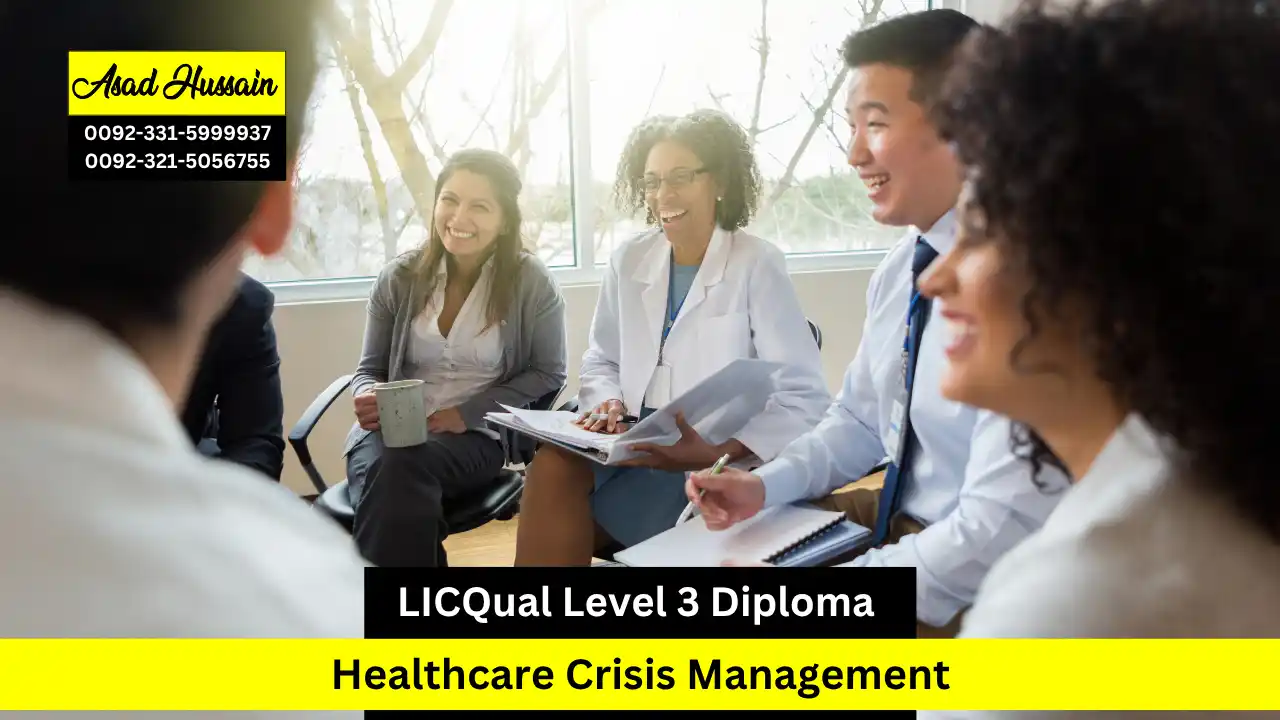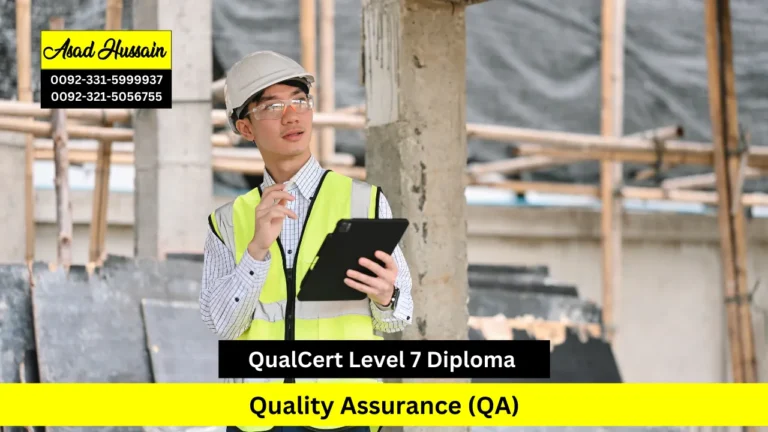The LICQual Level 3 Diploma in Healthcare Crisis Management is a professional qualification designed to address the urgent global need for skilled crisis leaders in healthcare. With healthcare systems facing unprecedented pressures from pandemics, natural disasters, and technological disruptions, the ability to manage emergencies effectively has never been more critical. This diploma equips learners with advanced knowledge, strategic insight, and practical tools to respond decisively in high-stakes situations, ensuring patient safety and organizational stability. It is a forward-looking program that prepares healthcare professionals to lead with resilience in a constantly evolving environment.
LICQual Level 3 Diploma in Healthcare Crisis Management is to provide learners with a structured framework for identifying risks, preparing for emergencies, and executing response plans under pressure. Participants will study crisis communication strategies, governance protocols, and risk assessment methods that align with international best practices. By focusing on healthcare-specific challenges, the course bridges the gap between theoretical crisis models and real-world applications. Learners will gain the ability to anticipate vulnerabilities, develop proactive strategies, and safeguard critical healthcare operations during periods of disruption.
One of the key strengths of this diploma is its emphasis on practical, actionable skills. Learners will not only acquire knowledge of crisis management frameworks but will also engage in developing recovery plans, coordinating multidisciplinary teams, and applying decision-making techniques in urgent scenarios. The course fosters leadership competencies, enabling learners to remain calm, confident, and effective when guiding healthcare staff through emergencies. By building these practical skills, graduates will be able to implement structured responses that minimize risks, maintain quality care, and accelerate recovery in post-crisis environments.
The LICQual Level 3 Diploma in Healthcare Crisis Management also emphasizes the importance of governance, ethics, and compliance in emergency situations. Learners will explore how healthcare policies, legal requirements, and ethical considerations influence crisis response strategies. They will gain the ability to engage with diverse stakeholders, from clinical teams to regulatory bodies, ensuring that all actions are aligned with safety standards and professional integrity. This holistic approach allows graduates to act not just as crisis responders, but as responsible leaders who understand the broader implications of their decisions.
Graduates of this qualification will be fully prepared to design and implement healthcare crisis management frameworks within hospitals, clinics, public health organizations, and emergency response units. The diploma serves as a pathway for career progression in healthcare management, disaster response, and risk leadership. Learners will enhance their employability, gain global recognition, and position themselves as professionals capable of making significant contributions to healthcare resilience. By completing this diploma, learners will be equipped to safeguard patient care, strengthen organizational preparedness, and contribute to the creation of safer, more reliable healthcare systems.
In conclusion, the LICQual Level 3 Diploma in Healthcare Crisis Management is more than a qualification—it is an essential investment for those who aspire to play a leading role in strengthening healthcare systems against future crises. The program offers a balance of theoretical understanding and practical application, ensuring learners gain both academic knowledge and hands-on expertise. Whether aiming for leadership roles, advancing professional growth, or preparing for global challenges, this diploma provides the skills, confidence, and recognition needed to excel in healthcare crisis management.
Program Highlights
Mandatory Units
- Principles of Healthcare Crisis Management
- Risk Assessment and Preparedness Planning
- Crisis Response and Incident Management
- Communication and Stakeholder Engagement during Crises
- Recovery, Evaluation, and Continuous Improvement
- Professional and Ethical Responsibilities in Healthcare Crisis Management
The LICQual Level 3 Diploma in Healthcare Crisis Management is designed for individuals aspiring to build expertise in preparing for, responding to, and managing crises within healthcare systems, while developing skills in leadership, risk assessment, and organizational resilience. To ensure learners are well-prepared for the academic and professional requirements of this qualification, specific entry requirements are established to maintain the quality and integrity of the program.
Age Requirements:
- Applicants must be at least 18 years old at the time of enrolment.
- Candidates under 18 may be considered only with written parental or guardian consent and evidence of maturity and readiness for higher-level study.
Educational Requirements:
- A minimum of a high school diploma (or equivalent) is required.
- Previous study in healthcare, management, emergency response, or social sciences is advantageous but not mandatory.
Professional Experience:
- While not compulsory, 1–2 years of experience in healthcare, emergency response, administration, or related fields is preferred.
- Practical exposure to healthcare operations, crisis planning, or risk management initiatives provides learners with a stronger foundation for the program.
English Language Proficiency:
- Strong English reading, writing, and communication skills are essential for successfully completing this diploma.
- International applicants must provide proof of English proficiency through recognized assessments such as IELTS (minimum score of 5.5) or an equivalent qualification.
Learners who meet these entry requirements will be well-prepared to excel in the LICQual Level 3 Diploma in Healthcare Crisis Management, gaining essential knowledge and skills to lead emergency responses, coordinate teams, and achieve effective outcomes during healthcare crises. This qualification also serves as a progression pathway to advanced studies, such as the LICQual Level 4 Diploma in Healthcare Management, enabling learners to strengthen their professional development and recognition in the global healthcare sector.ent, enabling learners to strengthen their professional development and recognition in the global healthcare sector.
The LICQual Level 3 Diploma in Healthcare Crisis Management equips learners with essential knowledge, practical skills, and professional competencies required to prepare for, respond to, and manage crises effectively within healthcare systems. In today’s unpredictable world, healthcare organizations are increasingly faced with critical challenges such as pandemics, natural disasters, cyber threats, and large-scale emergencies. This diploma ensures learners develop the expertise to safeguard patient safety, coordinate emergency responses, and strengthen healthcare resilience during high-pressure situations. Upon completing this qualification, learners will demonstrate strong capabilities in risk assessment, emergency planning, crisis communication, and recovery strategies to maintain operational efficiency and continuity.
Fundamentals of Healthcare Crisis Management:
- Understand the key principles, scope, and importance of crisis management in healthcare organizations.
- Explore the relationship between well-structured crisis management, patient outcomes, and long-term organizational success.
- Examine crisis lifecycle models, including preparedness, response, and recovery phases, and their direct application to healthcare operations.
- Identify critical risk factors, crisis triggers, and their potential impact on patient safety and healthcare delivery systems.
- Develop the ability to design structured response strategies and apply them effectively in real-world crisis scenarios.
Crisis Planning, Preparedness, and Resource Management:
- Learn techniques for building comprehensive emergency preparedness plans tailored to healthcare environments.
- Understand the importance of effective resource allocation, contingency planning, and surge capacity management during emergencies.
- Analyze staffing models, workload distribution, and medical equipment utilization to ensure uninterrupted care delivery.
- Assess potential risks proactively and create effective mitigation strategies to minimize service disruptions.
- Develop frameworks to optimize human, financial, and technological resources for rapid and efficient crisis response.
Risk Assessment and Quality Assurance in Crisis Situations:
- Gain in-depth knowledge of risk identification, assessment, and mitigation techniques during healthcare emergencies.
- Apply internationally recognized risk management frameworks to safeguard patient safety and organizational stability.
- Monitor crisis response processes against healthcare standards, performance benchmarks, and compliance requirements.
- Evaluate the impact of decision-making on staff safety, cost-effectiveness, and quality of patient care.
- Implement quality assurance and continuous improvement strategies to strengthen future crisis preparedness.
Healthcare Policy, Governance, and Stakeholder Engagement:
- Examine how healthcare policies, regulatory frameworks, and governance structures influence crisis planning.
- Understand the compliance and accountability mechanisms required during healthcare emergencies.
- Develop effective strategies for engaging stakeholders, including healthcare staff, patients, communities, and regulators.
- Assess how crisis management strategies align with organizational objectives, legal requirements, and ethical standards.
- Promote transparent communication, trust, and collaboration across crisis management teams and external partners.
Crisis Communication, Leadership, and Team Coordination:
- Learn methods for maintaining clear and effective communication during emergencies to reduce confusion and panic.
- Apply leadership strategies and decision-making models to guide healthcare teams under stressful conditions.
- Develop frameworks for coordinating multi-disciplinary crisis response teams to ensure seamless collaboration.
- Strengthen critical thinking and problem-solving skills to manage unpredictable and complex crisis events.
- Cultivate adaptability, resilience, and confidence as essential leadership traits in healthcare crisis environments.
Emergency Response, Recovery, and Professional Development:
- Learn structured methods for designing and executing effective emergency response systems.
- Develop recovery plans to restore healthcare safety, continuity, and operational efficiency following critical events.
- Apply monitoring, evaluation, and reporting techniques to measure the effectiveness of crisis management interventions.
- Strengthen professional competence in managing multiple crises across diverse healthcare settings.
- Prepare for career progression and advanced qualifications in healthcare crisis management, leadership, and emergency planning.
Upon completion of the LICQual Level 3 Diploma in Healthcare Crisis Management, learners will be fully equipped with practical expertise, critical analysis, and leadership abilities to design and implement robust crisis management strategies. Graduates will be prepared to contribute to safer healthcare environments, improve patient outcomes during emergencies, and pursue advanced studies or leadership roles in healthcare management, disaster planning, and organizational resilience.e advanced studies in healthcare management, project leadership, and operational excellence..
The LICQual Level 3 Diploma in Healthcare Crisis Management is a globally recognized qualification designed for individuals who want to play a vital role in safeguarding healthcare systems during times of uncertainty and disruption. In today’s world, healthcare organizations face unprecedented challenges such as pandemics, natural disasters, cyberattacks, and large-scale emergencies that demand skilled leadership and resilience. This diploma equips learners with the ability to assess risks, design crisis preparedness frameworks, coordinate effective emergency responses, and implement recovery strategies that ensure continuity of care. It also emphasizes critical areas such as governance, stakeholder engagement, and crisis communication to strengthen decision-making under pressure. By completing this qualification, learners will be prepared to respond confidently to emergencies, protect patient safety, and support healthcare organizations in maintaining operational stability during crises.
Healthcare Crisis Managers and Coordinators
- Professionals who are directly responsible for planning, preparing, and managing healthcare crisis response strategies.
- Individuals aiming to build expertise in risk assessment, emergency planning, and resource allocation during crises.
- Learners who want to master rapid decision-making and execution of contingency plans under high-pressure conditions.
- Those seeking to enhance skills in coordinating multi-level responses across departments and healthcare systems.
- Professionals determined to design and implement sustainable frameworks for healthcare crisis resilience.
- Crisis managers looking to develop advanced monitoring and evaluation methods for emergency interventions.
- Individuals aspiring to align crisis management strategies with global best practices and organizational priorities.
- Learners committed to ensuring patient safety and healthcare service continuity during emergencies.
Healthcare Practitioners and Administrators
- Doctors, nurses, paramedics, and public health officers seeking to expand their expertise into structured crisis management.
- Hospital and clinic administrators looking to integrate emergency preparedness into healthcare delivery.
- Practitioners aiming to adopt evidence-based approaches to improve crisis response and patient outcomes.
- Healthcare staff who want to develop skills in managing high-risk situations in clinical and community settings.
- Professionals seeking to strengthen their knowledge of infection control, disaster readiness, and safety protocols.
- Individuals committed to improving operational efficiency during emergencies while ensuring compliance with standards.
- Administrators who want to enhance coordination between clinical staff and support services during crises.
- Learners focused on applying effective leadership strategies in both acute and long-term emergency situations.
Supervisors and Team Leaders
- Leaders overseeing healthcare teams, units, or programs who want to develop strong crisis leadership abilities.
- Supervisors aiming to improve their communication and decision-making skills under high-pressure conditions.
- Team leaders responsible for ensuring collaboration and efficiency during emergency response phases.
- Professionals interested in coordinating cross-functional teams to manage critical healthcare events.
- Leaders who want to gain skills in conflict resolution and staff motivation during challenging scenarios.
- Supervisors determined to strengthen their ability to oversee recovery strategies post-crisis.
- Individuals seeking to develop resilience-focused leadership qualities to support long-term organizational stability.
- Professionals aiming to establish a culture of preparedness within their healthcare teams.
Emergency Planners and Safety Officers
- Professionals tasked with designing emergency preparedness and disaster recovery plans for healthcare institutions.
- Safety officers responsible for implementing compliance frameworks during crises to meet legal and regulatory standards.
- Individuals aiming to enhance their knowledge of crisis governance and policy-driven healthcare strategies.
- Planners seeking to build effective contingency plans for pandemics, natural disasters, or technological failures.
- Learners focused on assessing organizational vulnerabilities and designing proactive mitigation strategies.
- Professionals who want to ensure healthcare infrastructure and systems remain operational under extreme conditions.
- Individuals committed to building robust communication frameworks between staff, patients, and external agencies.
- Safety officers aspiring to align healthcare emergency plans with global standards and ethical practices.
Career-Focused Learners
- Individuals aspiring to progress into specialized roles in healthcare crisis management or disaster response.
- Learners seeking qualifications that open pathways to advanced studies in healthcare leadership or emergency planning.
- Career-driven individuals motivated to contribute to the resilience of global healthcare systems.
- Professionals looking to strengthen their credibility and recognition in healthcare safety and crisis leadership.
- Learners committed to developing strong analytical and decision-making skills for managing large-scale crises.
- Individuals wishing to gain practical expertise to handle complex and unpredictable healthcare emergencies.
- Career-focused professionals seeking to enhance employability in healthcare, government, or humanitarian sectors.
- Learners determined to take on leadership roles in building safer, more resilient healthcare environments.
This diploma is a perfect choice for learners who are passionate about achieving professional excellence in healthcare crisis management. It provides in-depth knowledge, critical skills, and advanced leadership competencies to effectively plan, manage, and recover from crises in diverse healthcare environments. Graduates will be well-prepared to make meaningful contributions to patient safety, healthcare continuity, and organizational resilience while pursuing rewarding careers in crisis leadership, emergency preparedness, and disaster management.







